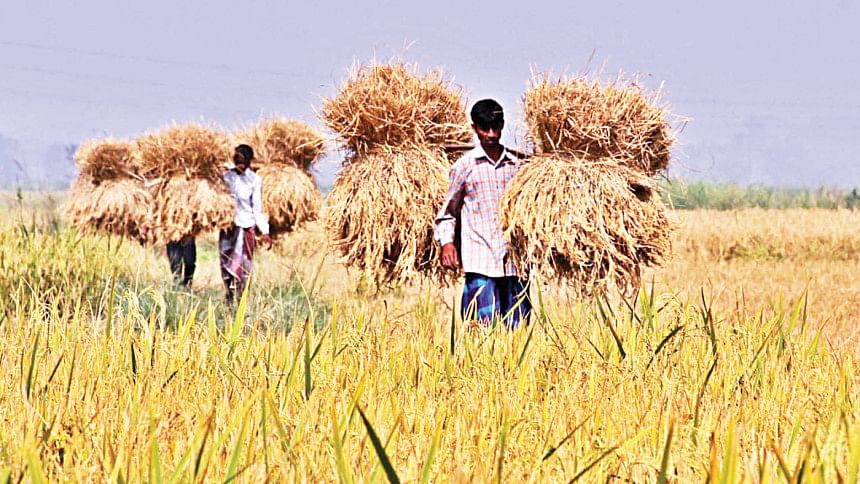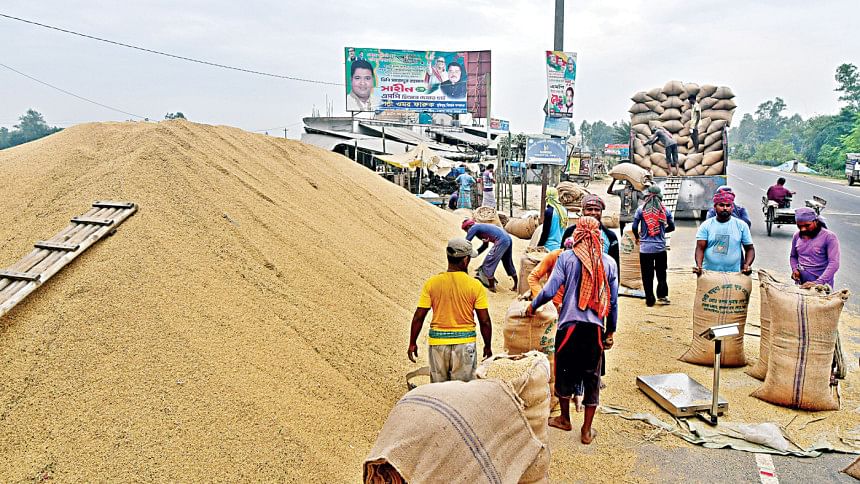Early Aman Season: High costs, low prices worry northern farmers

As farmers start harvesting and threshing early varieties of Aman paddy in the northern districts, the fear looms that their profit could be negligible due to higher production costs than last year.
In some cases, the price of paddy is even lower than last year, farmers said, adding that it is hard for them to make a profit of even Tk 50 per maund.
But the production cost increased this year as they have had to spend more on irrigation and pesticides.
Officially, a maund is equivalent to 37.32 kilogrammes, but it has become the practice in local markets to measure a maund as 40kg.
Visiting the Tengamagur seasonal paddy market in Bogura's Shajahanpur upazila last week, The Daily Star found paddy traders buying BRRI-49 (a fine variety of Aman) between Tk 1,120 and Tk 1,180 per maund.
Abdur Rouf, a paddy trader, said, "Last year, we bought BRRI-49 paddy for Tk 1,300-1,400 per maund. This year, prices are downa little due to the countrywide blockades. Traders from different districts are not coming due to fear of arson attacks."
Faridur Rahman, sub-assistant agriculture officer of the Bogura Department of Agricultural Extension (DAE), said, "We estimated the production cost of one kg of Aman paddy at Tk 28 for this season (Tk 1,120 per maund)."
Last year, the production cost was Tk 26.50 per kg, he said.
Sarowar Hossain of Palsa village of Dinajpur's Ghoraghat upazila said he spent Tk 23,500 -- up from Tk 17,000 last year -- to cultivate Aman (BRRI-49 and Swarna-5) on 50 decimals of land this year and harvested 23 maunds of paddy.

He spent Tk 2,000 to purchase seeds and prepare the seedbed, Tk 3,000 on ploughing, Tk 2,000 on irrigation and weeding, Tk 2,500 on labourers, Tk 7,000 on fertiliser and pesticide, and Tk 7,000 on harvesting and threshing.
His production cost came out to Tk 1,021 per maund.
"Last year, the yield was better and the paddy price in our upazila was almost the same, but production cost increased as we had to irrigate land during cultivation [September] due to less rainfall. Also, it rained heavily throughout October and so there were more pest and insect attacks than last year," Sarowar said.

"I spent Tk 2,200 on pesticides last year, but this year it was Tk 5,000," Sarowar added.
Sarowar said he found the price of BR-11 was Tk 1,000 a maund, Swarna-5 Tk 1,100, and BRRI-49 Tk 1,150 when he went to the market on Thursday.
Abdur Rouf, a farmer in Gaibandha's Gobindaganj upazila who cultivated Swarna-5 on five bighas this season, said, "Due to increase in fuel and fertiliser prices, production costs in our area increased too."
He said the price of urea fertiliser increased by Tk 300-350 per sack this year.
Nirod Baran Saha, president of the Rice and Paddy Stockists and Wholesalers Association in Naogaon, said the price of paddy is almost the same as last year. After a month or so, the price would increase when the paddy will be drier.
"If the production cost increases, the profit margin of farmers decreases, the government should have taken measures and compensated farmers," he said.
Many farmers, however, cannot afford to wait for the prices to rise as they have debts to pay.
"If the paddy price is so low, how will we survive when everything is so expensive?" asked Sabirul Islam, a farmer in Khochabari area of Thakurgaon.
He got just Tk 7,000 after selling 7 maunds of paddy a week ago, and expressed despair over unpaid debts due to the inadequate prices.
AM Asaduzzaman, former research director of Bangladesh Institute of Development Studies (BIDS), said the situation of farmers is not improving.
"Middlemen, wholesalers and millers control prices in the paddy market and make profits. The government has failed to control them," he said.
When asked whether the government can purchase paddy directly from the local market to minimise the influence of the millers and wholesalers, he said the government does not have the capacity to do so.
This year, the government has set a target to cultivate Aman, the second biggest rice crop, on 59.3 lakh hectares, according to DAE officials.

 For all latest news, follow The Daily Star's Google News channel.
For all latest news, follow The Daily Star's Google News channel. 




Comments